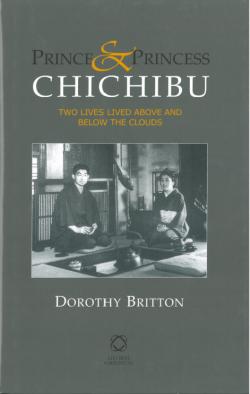Prince and Princess Chichibu, Two Lives Lived Above and Below the Clouds

Review by Sir Hugh Cortazzi
In 1996 Dorothy Britton’s translation of part of Princess Chichibu’s memoir was published under the title The Silver Drum which was a sweet box given to the Princess by the Empress Dowager, the wife of the Taisho Emperor. She has now translated the whole of the memoir including various poems by the Princess.
She has also added a new chapter at the beginning entitled “The Prince: A Vindication.” In this Dorothy Britton declares: “Masayasu Hosaka’s biography, published in 2000, makes clear once and for all that Prince Chichibu, Japan’s popular ‘Sports Prince,’ was not an eminence grise behind the famous ‘2/26 Incident.’” She notes that the Prince who was serving with the army in Aomori at the time of the incident told his fellow officers that “the regrettable action was completely opposed to His Majesty’s wishes; and ordered them not to align themselves with the rebels under any circumstances, and to refrain from doing anything rash.” But Prince Chichibu was surely unwise when according to General Honjo, aide de camp to the Emperor in 1933, he vehemently advocated to the Emperor “the necessity of direct Imperial rule even if it meant suspending the constitution in order to improve the lot of the masses.” The Emperor disagreed. “Prince Chichibu apparently hectored the Emperor a second time … [and] is said to have had a bit of a temper and tended to forcefully ‘thunder’ his opinions when he felt strongly about anything.” It is a pity that the Prince’s stay in Britain in 1926 was so short. He had been entered at Magdalen, Oxford, but had barely taken up residence when he was recalled to Japan on the death of his father the Taisho Emperor. Nevertheless he retained an affection for Britain and recalled his time in Britain with nostalgia.
The Princess’s personal memoir, sensitively translated by Dorothy Britton, with its account of the Japanese court will make readers sympathise with both the ordeals of Empress Michiko and Princess Masako when they joined the Imperial family. Princess Chichibu was most reluctant to accept the proposal that she should marry the young prince and in her reluctance she was supported by her parents, but the pressure from the Empress Dowager forced her acceptance. Once she became a princess she was not allowed before the war to do anything for herself, but she had to follow all the antiquated protocol. She recalls with embarrassment some of her ‘blunders’ arising from her ignorance of absurd rules: “The first one was when we returned to Tokyo after the enthronement ceremonies [for the Showa Emperor] and visited the Tama Imperial mausoleum with Their Majesties. I should have ascertained carefully beforehand how many times I was expected to bow, but the prince had assured me that all I needed to do was to copy him, which I did – only to hear someone’s discreet chiding voice behind me, ‘Since Your Highness is on the distaff side, you should have turned once more, stopped, and bowed. Remember to do so next time.” I was cut to the quick. Moreover, I had no idea what was meant by ‘the distaff side.’ Later, back in my own room I remember how downcast and dejected I felt.”
Later in the war years at Gotemba, where the Prince who was suffering from tuberculosis had gone in the hope of a cure, Princess Chichibu apart from ministering to the Prince, developed her gardening skills in growing vegetables and farming. She had had to come down below ‘the clouds.’
This charming memoir makes it clear why Princess Chichibu became the British Royal Family’s favourite member of the Japanese Imperial family. Prince Charles apparently always called her his Japanese grandmother.
This memoir is also a reminder of the unreality of much of the life of members of the imperial and royal families. In Japan existence ‘above the clouds’ is complicated by the old myths about the divine origins of the imperial family. In Japan the Emperor whom we should really call Tenno has never in recent centuries been an autocrat but there are still apparently some people in Japan who believe in his divine origin.

